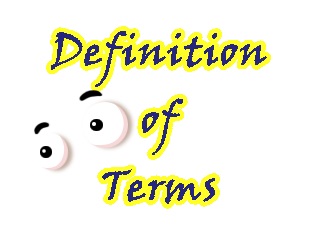 Basic education curriculum. The education intended to meet basic learning needs which lays the foundation on which subsequent learning can be based. It encompasses early childhood, elementary and high school education as well as alternative learning systems four out-of-school youth and adult learners and includes education for those with special needs.
Basic education curriculum. The education intended to meet basic learning needs which lays the foundation on which subsequent learning can be based. It encompasses early childhood, elementary and high school education as well as alternative learning systems four out-of-school youth and adult learners and includes education for those with special needs.
Bricolage. Combines the French word bricoleur (do it yourself) with collage, indicating the creative juxtaposition and inventiveness of this method of research.
Caramelization. Normally associated with fruits with significant sugar content. Caramelizing is simply the burning of sugars.
Casehardening. Is caused by too much temperature, too much air velocity and too little humidity. Symptoms include a virtual halt in dehydration and a tough leather-like outer skin. Increasing the humidity is the key to salvaging the product and normally through re-hydration. .
Counter-flow. Refers to the direction of the air- flow within the dryer. The fresh produce laden tray enters the dryer through the low- pressure inlet. Counter-flow dehydration is normally associated with a lower process air temperature and higher quality dried products. Drying is accomplished from the inside out and casehardening is rare.
Curriculum. The set of courses and their contents offered by an educational entity or institution related to a specific learning program.
Dehydration. In food technology is referred to as the removal of moisture in food; at present defined industrially as drying by artificially produced heat under carefully controlled conditions of temperature, humidity and air-flow (Von Loesecke, 1955).
Dehydrator. In household food technology, food dryer; is an electrical appliance for drying food especially fruits and vegetables by extracting most of the moisture from it.
Design. Referred to in technology as the soul of the production, manufacturing and creative industries; creates change in the man-made world.
Diffusion theory. It is the process by which an innovation is adopted by members of a community.
Disciplinary structure. It is the cultural formation with historically specific conditions of origin, expansion, change, transformation, decline and demise; methodology specifically related to the focus of inquiry and broadly related to research strategies in the humanities, social sciences, sciences and creative or performing arts..
Efficiency. In the realm of technology, a measure of a machine’s energy effectiveness; the ratio of the amount of energy used by a machine to the amount of work done by it.
Evaporation. A process in which matter is changed from a liquid to a vapor without its temperature reaching the boiling point.
Fan. It is an accessory used to blow a current of air steadily and lightly across or around a matter.
Food science. The application of science and engineering principles in the processing, preservation, storage, handling and distribution of food.
Grounded theory. The theory derived from the process of constant comparisons, discovered, developed and provisionally verified through systematic data collection and analysis of data.
Heating element. It is an insulated or covered wire whose high resistance to an electrical current causes its temperature to rise providing heat to the surrounding materials.
Hermeneutic. The development and study of theories of interpretation and understanding of texts
Heuristics. It is the rigorous way of approaching material by trial and error and as such is used in computer research to describe the process of refinement of applications.
Inductive learning and teaching. The umbrella term encompasses a range of instructional methods including inquiry learning, problem based learning, project based learning, case-based teaching, discovery learning and just-in-time teaching.
Innovation. The term defined by Peter Drucker as a change that creates a new dimension of performance or as Rogers (2003) suggests, it is about getting ideas adopted.
Makabayan. Colloquially termed as love for country; a subject in the revised basic education curriculum that integrates the five different learning areas namely Araling Panlipunan at Heograpiya, Teknolohiya, Edukasyon, Pantahanan at Pangkabuhayan, Physical education Health Music and Art and Values education in one subject.
Methodological Eclecticism. A constant switching between different research methods.
Moisture. Droplets of condensed or absorbed liquid or in vapor. It is the amount of water present on a certain substance measured on percentage basis.
Pedagogy. paideia, the science, craft and art of teaching children basic education with age range from seven to seventeen.
Preserve. A method to treat or store food in such a way to protect it from decay done by pickling, drying, salting, freezing and canning.
Process. The method of preparation by a series of steps using chemicals or industrial machinery.
Quasi-statistics. The data that may not allow precise quantification or meet statistical requirements but give some indication how likely a conclusion is applicable.
Relative Humidity. It is the ratio of the partial pressure of water vapor in the air to the saturation pressure corresponding to the temperature of air.
Secondary Analysis. A descriptive research study that consists of re-analyzing the data gathered by previous researcher/s and may involve a different hypothesis, different experimental design or different methods of statistical analysis. The subjects are the same, the data are the same.
Simulacra theory. A theory that covers the discussion of images, signs and how they relate to society to a world saturated by imagery, infused with media, sound and advertising.
Spoilage. It is the process of decaying or becoming damaged or rotten.
Sulfuring. An antioxidant method of treatment to preserve color, prevent loss of vitamin A and C and discourage insects and microbes in fruits.
Technology. Defined as a purposeful application of knowledge, skills and experiences in using resources to create products or systems to meet human needs.
Theory. Is a set of inter-related constructs, definitions and propositions that present a rational view of phenomena by explaining or predicting relationships among those elements either mathematical/analog relationship or conceptual holistic relationship.
Verstehen. Term for interpretative sociology; German for understanding.